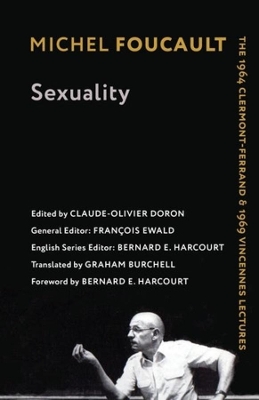Reviewed by annieb123 on
Sexuality: The 1964 Clermont-Ferrand and 1969 Vincennes Lectures is a translated reprise of Michel Foucalt's lectues in 1964 (Clermont-Ferrand) and 1969 (Vincennes) which formed the basis of some of his later work. Released 13th July 2021 by Columbia University Press, it's 440 pages and is available in paperback and ebook formats.
These lectures occurred at a time when homosexuality was still considered a medically pathological diagnosis. Although sociological upheavals and cultural shifts were being felt, the fact remained that sexuality was taboo and not well examined in most disciplines and academia was no exception generally.
This book is arranged into chronological order with the Clermont-Ferrand lecture first, followed by the Vincennes. The lectures themselves are translated directly with copious annotations and explanations. This is deeply academic material. I am a STE(A)M nerd and consider myself an academic, and I found some parts of it very onerous and inaccessible. It reminded me in both format and style of other famous transcribed lectures such as the Feynman lectures (with which I have had more success because I'm a STE(A)M nerd).
The translation work was seamless to me as an end-user (although I did not compare it to the original French).
I found this volume interesting and intriguing. It is, admittedly, a niche book and will appeal to readers interested in culture, human sexuality, and philosophy, but probably won't appeal to readers looking for an easy read. The language is rigorous and formal. I definitely don't think it's inaccessible for the average reader, but it will take some effort (and I think that's a good thing). This would make a good support text for classroom or library use, for psychology, philosophy and allied subjects, as well as a superlative read for the particularly cultural-history-interested reader.
Five stars. This is a well and deeply researched and engaging look at core concepts of sexuality and thoughts of one of the indisputably great minds of the 20th century.
Disclosure: I received an ARC at no cost from the author/publisher for review purposes.
Reading updates
- Started reading
- 26 July, 2021: Finished reading
- 26 July, 2021: Reviewed
